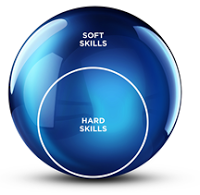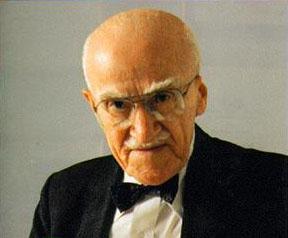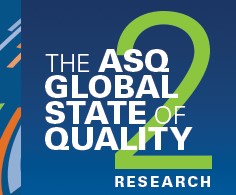This month, Julia McIntosh of ASQ’s Communications department wrote about different themes discussed in the past ASQ’s World Conference on Quality and Improvement 2013 in Indianapolis-Indiana, and I’ve selected “soft skills” to be my topic for the monthly Influential Voices discussion.
During the conference, Sally Hogshead and James Melton talked about “soft skills”, emphasizing in the importance of making oneself likeable, fascinating, and charming, and treating strangers with the same courtesy as you do loved ones, in order to “go far”. When they had to answer the question: Do soft skills matter if you’re extraordinary at the technical aspects of your job?, their both answered YES, and I totally agree with.
But before continuing, let’s have a quick review of what soft (and hard) skills are.
Soft skills (Wikipedia) are personal attributes that enhance an individual’s interactions, job performance and career prospects; in and outside the workplace. A set of “soft skills” is related to a person’s “EQ” (Emotional Intelligence Quotient). Some examples are personal qualities, personal traits (common sense, responsibility, a sense of humor, integrity, etc), social graces, communication, language, personal habits, self-confidence, friendliness, ethic, positive attitude, optimism, etc.
Also, “soft skills” refer to behavioral competencies, abilities that can be practiced such as empathy, conflict resolution and negotiation, personal effectiveness, creative problem solving, leadership, strategic thinking, team work, time management abilities, ability to accept and learn from criticism, flexibility, adaptability, working well under pressure, just to name a few.
On the other hand, hard skills are person’s technical skills and abilities to perform a certain type of task or activity (part of a person’s IQ, Intelligence quotient). In other words, they are the technical/occupational requirements to perform a job. i.e: if you want to be an obstetrician, you have to go to college to study to become a doctor and then specializing in the obstetrician field.
So the question is; depend on your profession, job or during an interview, are “soft skills” more important, over the long term, than “hard skills”? I think that both sets of skills are a complement, you are not going to be successful in your job interview or at work with one set without the other. However, in this globalized and continual changing world, “soft skills” are getting more important; it’s not enough to be highly trained in hard skills, without developing the softer, relationship-building skills that are crucial for career success, good communication and collaborate effectively in order for a company to remain competitive and productive.
Another way to look at this is from the perspective of a customer. Let’s create a scenario from one experience of mine as a mom. Let’s think you need to find an Obstetrician because you are pregnant, if you are a woman or your wife is. You have a lot of good references from different doctors they are good on their field, but after interviewing them, and beyond their “hard skills”, the question is: Which one are you going to choose? The one who is kind, lovely, takes time to answer your list of questions? Or the one who treats you like an “another mom asking boring questions”? So for you, as a customer, even when you need a trained doctor, it’s the “soft skills” that really matter in your final decision.
My experience as Quality Engineer has showed me also, that “soft skills” were way more important than “hard skills”. When I was hired for my first job as Quality Engineer I din’t have any experiences and I was just finishing my grad. After a year of working hard and learning, and because of my “soft skills”, my way to get along with people and working with a positive attitude, I was performing audits and reviews for different software projects managed for people with more than 15 years of experiences; and we worked together very easily and effectively.
To finish, I would like to share a quote abut the topic: “Hard skills will get you an interview, but you need soft skills to get (and keep) the job“






1 Comment
easytolearn · May 26, 2015 at 7:33 pm
I am happy to find your distinguished way of writing the post. Now you make it easy for me to understand and implement the concept. Thank you for the post.
Comments are closed.